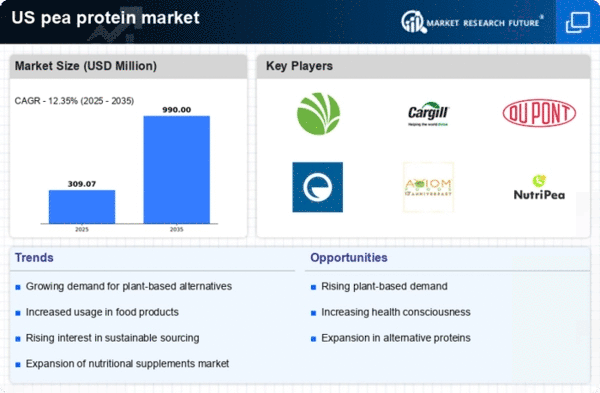Innovations in Food Technology
Innovations in food technology are playing a transformative role in the pea protein market. Advances in processing techniques and product development are enabling manufacturers to create high-quality pea protein products that meet diverse consumer needs. For instance, the development of textured pea protein has opened new avenues for meat alternatives, appealing to both vegetarians and flexitarians. Additionally, the incorporation of pea protein into various food applications, such as dairy alternatives and snacks, is expanding its market reach. As food technology continues to evolve, the pea protein market is likely to benefit from enhanced product offerings that cater to a wider audience, thereby driving growth.
Increased Adoption of Vegan Diets
The growing trend of adopting vegan diets in the US is a pivotal driver for the pea protein market. As consumers become more conscious of their dietary choices, the demand for plant-based proteins, including pea protein, is surging. Reports indicate that the number of individuals identifying as vegan has increased by approximately 300% over the past decade. This shift is not merely a fad; it reflects a broader societal movement towards healthier eating habits and ethical considerations regarding animal welfare. Consequently, the pea protein market is experiencing heightened interest from food manufacturers seeking to cater to this demographic. The industry is likely to see innovations in product formulations that incorporate pea protein, further solidifying its position in the market.
Expansion of the Sports Nutrition Sector
The expansion of the sports nutrition sector in the US is a crucial driver for the pea protein market. Athletes and fitness enthusiasts are increasingly turning to plant-based protein sources to support their dietary needs. Pea protein, with its favorable amino acid profile, is gaining traction as a preferred ingredient in protein powders, bars, and ready-to-drink beverages. The sports nutrition market is expected to reach $45 billion by 2026, with plant-based options capturing a significant share. This growth presents a substantial opportunity for the pea protein market, as manufacturers seek to develop products that align with the preferences of health-conscious consumers and athletes alike.
Increased Focus on Sustainable Ingredients
Increased focus on sustainable ingredients is a significant driver for the pea protein market.. As consumers become more environmentally conscious, they are actively seeking products that align with their values. Pea protein, derived from legumes, is considered a sustainable protein source due to its lower environmental impact compared to animal-based proteins. The US market is witnessing a shift towards transparency in sourcing and production practices, with consumers favoring brands that prioritize sustainability. This trend is prompting food manufacturers to incorporate pea protein into their products, thereby enhancing the appeal of the pea protein market. The emphasis on sustainability is likely to continue shaping consumer preferences and industry practices.
Rising Health Consciousness Among Consumers
Health consciousness among consumers in the US is significantly influencing the pea protein market. As individuals prioritize their well-being, they are increasingly seeking protein sources that offer health benefits without the drawbacks associated with animal proteins. Pea protein is recognized for its high digestibility and rich amino acid profile, making it an attractive option for health-focused consumers. Market data suggests that the demand for protein supplements, including those derived from peas, is projected to grow at a CAGR of 8% through 2027. This trend is prompting food and beverage companies to innovate and expand their product lines to include pea protein, thereby enhancing the overall appeal of the pea protein market.
.png)
















